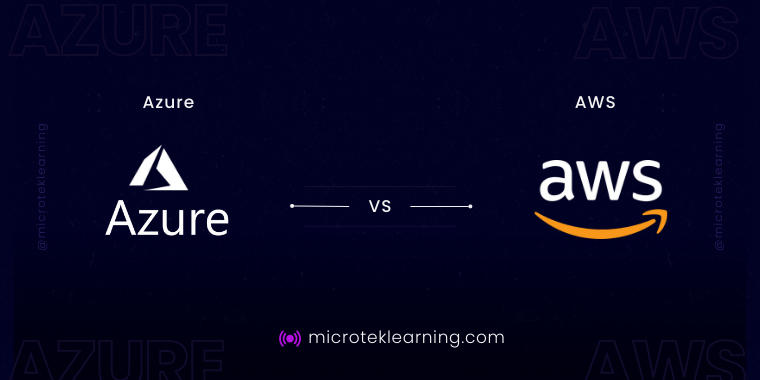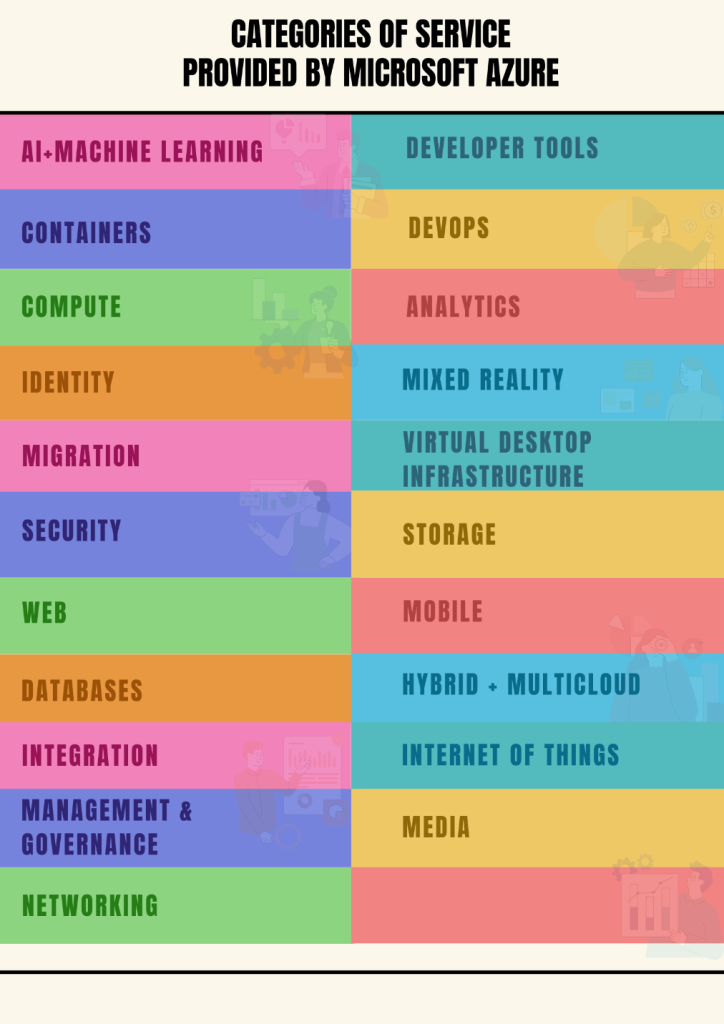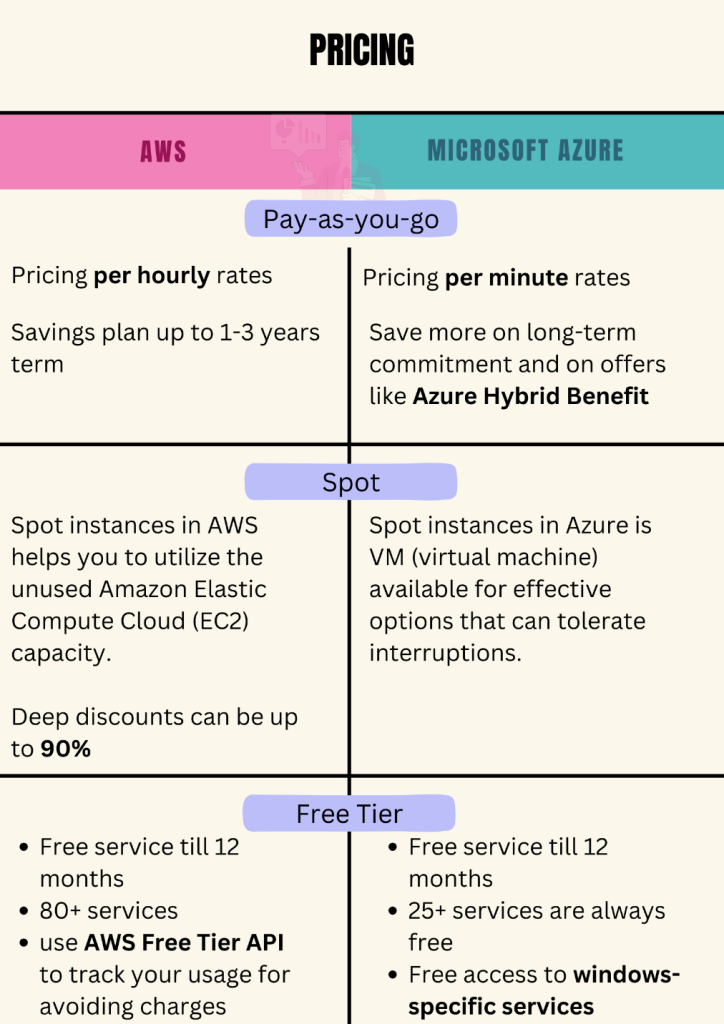
A digitally transformed world requires modern answers to save and use data securely. Azure by Microsoft and AWS by Amazon are profoundly the two biggest names in the industry for providing tailored and outstanding cloud computing services. Their contribution to the industry makes them the best platforms that provide prominent services. According to these statistics, Microsoft Azure holds 25% of the market share, while AWS controls 31%.
In this blog, we will explore the different aspects and features of these two notable names in the industry. This guide consists of a detailed evaluation of factors that can help you choose. Let’s dive in!
What do we know about Azure and AWS?
AWS, powered by Amazon, is one of the largest shareholders in the market, providing premium services. Initially starting in 2002 to handle retail of its own, Amazon launched its first web services. Continuing in 2006, they introduced pay-as-you-go cloud computing, and since then, there has been no seeing back.
Being the largest cloud computing provider in the world, AWS provides over 200 services and has data centers across the globe in 34 geographic regions, i.e., 245 countries. With more than a million active users, AWS has some of the most widely known client bases, including Netflix, Pfizer, Airbnb, and Kellogg’s. They are the first platform to provide Infrastructure-as-a-service Iaas services to consumers and thus have gained their popularity.
On the other hand, Microsoft’s Azure was first introduced in 2008 under the code name “Project Red Dog.” It was initially built as an extension of Windows NT, and Microsoft Cloud platform-as-a-service was launched commercially in 2010. With 95% of Fortune companies trusting Microsoft Azure, it has one of the largest portfolios in the industry. Havin approximately 722.22 million Azure users, this platform is widely within the span of 33 regions as of 2024.
Given their history, both platforms started as small ventures to solve problems and resulted in something bigger than ever. Their scalability and advanced features are a point of comparison when choosing what is best for your organization. This article dabs into important aspects of AWS vs Azure, and will help you make an informed decision. Also, if you need to learn more about what they offer in their domain, here is a cheat sheet you can use.
What is Azure?
Microsoft Azure is a widely used and globally accepted cloud-computing platform. With its users reaching the 1 billion mark, it is one of the popular names for cloud services that include analytics, storage, and networking. Its versatile characteristics of providing various services that are needed to solve challenges of business are commendable. From storing data to predicting its future to giving the freedom to build paths to distribute it, Azure can make it happen.
Evolving in the last few years, Azure today effortlessly delivers Paas (platform-as-a-service), Saas (software-as-a-service), Iaas (infrastructure-as-a-service), and serverless functions. They also crossed the benchmark when they optimized the use of third-party vendors and tools in the system.
An Azure user can significantly choose their required services and build applications to be presented in public. It also has features for finance, databases, integration, and blockchain.

What is AWS?
AWS is a cloud-computing platform introduced by Amazon initially in 2002, which further evolved into adding Iaas in 2006. Providing enterprises with services like content delivery and database storage, AWS is widely used and is one of the most approached platforms.
Considering its clients in the market, AWS is vividly known for being cost-effective. It is used by a wide range of organizations, including government institutions, private organizations, and non-profits.
Having services in 24 categories that include storage, gaming, message and notification, mobile development and monitoring. This makes it a scalable and low-cost platform that has easy access and solutions for every challenge a company can face.
AWS vs. AZURE
Azure and AWS are both prominent leaders in the cloud computing industry. Their robust features and efficient trademark of providing premium services for organizations make them stand out and create a platform for themselves in the marketplace.
Even though both giants are arguably close to each other in terms of deliverables, there are still some factors that can help you to consider your choice carefully.
To learn more about their tailored offering, let’s compare cloud Azure vs AWS’s some of the factors.
Azure vs AWS Pricing
AWS works on a pay-as-you-go model and is priced according to the wide range of services it provides. Its structure pricing is adaptable. Being rated on an hourly basis. On the other hand, Azure is known for its per-minute rates. Both Azure vs AWS features provide a competitive edge in delivering outstanding services.
The chart given below will help you to understand the highlights of their offerings.

Scalability
Azure and AWS are both celebrated industry leaders. Serving their consumers with premium services, they both have the best products on the market. However, there are certain areas that can serve as a middle ground for comparison.
Auto-Scaling:
Azure’s Virtual Machine Scale effectively enables horizontal scaling of VM resources. This method helps to fluctuate the number of resources; hence, it is a flexible way to run large numbers and further helps the VM handle the load.
While AWS has scaling policies for multiple resources. This includes Amazon EC2 Auto Scaling and Amazon Aurora. AWS auto-scaling also results in optimizing performance and costs.
Serverless Computing and Containers:
Azure’s fully managed serverless solution enables one to boost productivity. With features like Azure Kubernetes Service (AKS), you can automate scaling, as it provides you with integrated monitoring and logging.
AWS also allows serverless computing with the help of features like AWS Lambda, S3, and DynamoDB. It features automatic scaling, pay-for-use-billing, and optimized costs.
Availability and Global Reach:
With 60+ Azure regions and 300+ data centers, Azure excels in providing grounding support to its users. Being widely available, Azure’s high availability zones enable to promote workload scalability. This is especially useful for clients who need a global presence.
AWS, being one of the largest networks of 108 availability zones and 34 launched regions, works towards excellent scalability. In terms of global reach and infrastructure, AWS has a slightly higher advantage.
Security and Compliance
Threat detection:
Azure offers built-in threat protection. This is achieved with the help of tools like Azure Monitor Logs, Microsoft Defender for Cloud, and Azure Security Center. It also has monitoring and reporting tools, like Microsoft Entra ID Protection, that detect issues and configure risk-based policies. Furthermore, there is also an SIEM Microsoft Sentinel and SOAR (security orchestration, automation, and response solution.
Microsoft Azure threat deduction features are proven to produce excelling results and keep a strict eye on any potential threat to your data.
Likewise, AWS offers various tools for threat deduction, such as AWS GuardDuty, AWS Detective, and AWS Inspector. It is also equipped with functions like AWS Security Hub that enable notification for security alerts.
Security Services and Encryption:
Microsoft Azure provides multiple security services for cloud platforms that help you to process and meet the needs of your company. It, without a doubt, excels in integrating security services for Microsoft-centric organizations. A full list of security services can be found here.
On the other side, AWS provides a 360 response to security threats by introducing features like AWS Identity Services, AWS Detection and Response Services, Access Management (IAM), and AWS WAF (Web Application Firewall). Its consumer-based applications, like AWS KMS, give users control over encryption keys.
Performance
Storage Options:
Easily meeting the changing storage needs, Azure Storage is equipped with applications that ensure durability, scalability, and security. Some of these include Azure Blog Storage, Azure Data Lake Storage, and Azure Disk Storage. Given its competitiveness in the market, Azure’s Ultra Disks is an ideal provider of strong performance for latency-sensitive applications.
AWS works to provide support for demanding applications and has high-performing storage options like Amazon EBS (Elastic Block Store) and Amazon S3. With all this, AWS storage also has brilliant features that directly contribute to its cost-saving and durability. It is integrated and provides options like elastic volumes that can help you adapt volumes to your application’s needs and changes.
Network Performance:
In this part, Azure is an ideal candidate for providing a solid global network with the help of features like ExpressRoute for high-speed and private connections. With highly advanced applications like Azure Firewall and VPN Gateway, Azure provides a wide range of features that should be taken into consideration before planning.
However, AWS also has a robust global network infrastructure that has highlighting applications like AWS Global Accelerator. AWS, being cost-effective and flexible, is designed to deliver 99.99% of uptime commitment and is sufficient in scale to match the traffic load.
Conclusion – Azure vs. AWS which is better?
If you have read until this part of the blog, by now I am assured that you know both AWS and Azure are significantly dominant players in the industry. Their hold on providing excellent consumer service and non-negotiable standards in designing the applications is commendable.
AWS, on its part, is one of the largest shareholders in the market and is known for its strong infrastructure footprint. Be it security or compliance, AWS provides superior services and its experience in the cloud space has helped in developing effective auto-scaling, serverless computing options that will contribute to your business directly.
Azure, on the other hand, has advantages for organizations that are integrated with the Microsoft Ecosystem. Its VM scale sets, and serious security comprehension tools like Azure Security Center make it an ideal choice for organizations looking for multi-cloud strategies.
Thus, to conclude, AWS is a far better fit for enterprises that prioritize global reach and a wide range of customizable tools. Moreover, Azure is a Microsoft Centric business-focused cloud solution. Both the giants have their own advantages and are to be tailored to the needs of the organization.
FAQ’s
1. Which cloud is in demand?
There are several promising cloud services available, but Amazon Web Services owns a market share of 31%, followed by Azure at 25%.
2. Which is better, AWS or Azure?
Both are the most competitive in the market. Azure is, in general, considered premium for its integration, while AWS serves the best for an experienced team. The best platform can be guided rightly by the needs of the organization.
3. Which is easier to learn, AWS or Azure?
AWS and AZURE are both effective tools to provide tailored solutions. AZURE, being a top choice for Paas and AWS for Iaas, both have definitive material to gain its expertise. But IT professionals do believe that AWS certification is slightly easier to obtain and pays higher than AZURE.
4. Does AWS require coding?
NO, AWS cloud requires no experience in coding.
5. Does AZURE require coding?
NO, Microsoft AZURE requires no experience in coding.
6. Which one is cost-effective?
Tailored to your organizational needs, both platforms provide competitive discounts on long-term plans. AWS charges hourly rates, on the other hand, AZURE charges per-minute rates.
7. What are the highest-paying jobs in cloud computing?
Cloud Computing is one of the most in-demand sectors in the IT industry; hence, they have several certifications. Here are the top five job roles with their yearly income.
- Cloud Architect – $155,529
- Cloud DevOps Engineer – $130,000
- Cloud Security Engineer – $144,119
- AWS Administrator – $119.921
- Cloud Data Engineer – $112,421
8. Which pays more, AWS vs AZURE?
Both platforms need one to certify and have professional significance. But AWS professionals earn more than AZURE. For, e.g., a beginner in AWS would get a salary of $113,145 on the other hand, an AZURE professional would earn $103,000.
9. Which one should startups use AWS vs AZURE?
AWS, being the leader, has tailored choices and offers, but it can be result to be slightly expensive for startups. While Microsoft AZURE highlighting its seamless integration powered by the platform can be a better options for a company just starting out in the market.
10. Which cloud has the highest security?
Security is one of the topmost priorities when choosing a cloud-computing platform. Though AZURE and AWS are like comparing apples and apples, AWS holds a slightly higher place in terms of security.
Recommendation – Microsoft Azure vs AWS Certifications
Microsoft Azure Certification
Microsoft Azure has three levels of certification. Given below are some of the top recommendations for selecting the best certification and further details of the possible job roles one can land after completion of it.
Fundamental
| Sr. No. | Course | Job Position |
| 1. | AZ-900 Microsoft Azure Fundamentals | Cloud support Network administrator Data analyst |
| 2. | AI-900 Azure AI Fundamentals | AI Engineer Machine Learning Engineer Business Intelligence Developer |
| 3. | DP-900 Azure Data Fundamentals | Data Engineer Data Architect Database Administrator |
Associate
| Sr. No. | Course | Job Position |
| 1. | Azure Administrator [AZ-104] | Azure Network Engineer Azure AI Engineer Azure Data Engineer |
| 2. | Azure Developer [AZ-204] | Azure Solution Architect Cloud Architect Azure DevOps Engineer |
| 3. | Azure Security Engineer [AZ-500] | Cloud Solution Architect Security Consultant |
Expert
| Sr. No. | Course | Job Position |
| 1. | Azure Solutions Architect [AZ-305] | Cloud Architect Solution Architect Software Architect |
| 2. | Azure DevOps Engineer [AZ-400] | Azure DevOps Administrator |
AWS Certification
AWS has four levels of certification. Given below are some of the top recommendations for selecting the best certification and further details of the possible job roles one can land after completion of it.
Foundational
| Sr. No. | Course | Job Position |
| 1. | AWS Certified AI Practitioner | Cloud Architect Cloud Engineer Data Security Engineer |
| 2. | AWS Certified Cloud Practitioner | Cloud Developer Cloud Network Engineer Cloud Consultant |
Associate
| Sr. No. | Course | Job Position |
| 1. | AWS Certified Developer Associate | DevOps Engineer |
| 2. | AWS Certified Solutions Architect | SysOps Administrator Cloud Developer Cloud Security Engineer |
| 3. | AWS Certified Data Engineer | Data Engineer |
Professional
| Sr. No. | Course | Job Position |
| 1. | AWS Certified DevOps Engineer | Cloud support Network administrator Data analyst |
| 2. | AWS Certified Solution Architect | Cloud DevOps Engineer Senior DevOps Engineer AWS Solution Architect |
Specialty
| Sr. No. | Course | Job Position |
| 1. | AWS Certified Advanced Networking | Cybersecurity Engineer Global IT Cloud Database Engineer |
| 2. | AWS Certified Machine Learning | AI Data Specialist AWS Engineer |
| 3. | AWS Certified Security |



